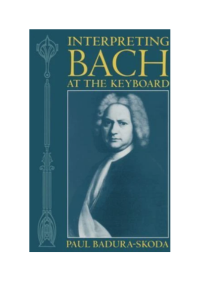December Pick | Selected by Dr Tom Farrell
Paul Badura-Skoda | Interpreting Bach at the Keyboard
 In the introduction to his edition of the Goldberg Variations Ralph Kirkpatrick borrows a phrase from Sir Thomas Browne’s Religio Medici, which could with justice be applied to virtually all of Bach’s keyboard music - ‘it is a sensible fit of that harmony which intellectually sounds in the ears of God’.
In the introduction to his edition of the Goldberg Variations Ralph Kirkpatrick borrows a phrase from Sir Thomas Browne’s Religio Medici, which could with justice be applied to virtually all of Bach’s keyboard music - ‘it is a sensible fit of that harmony which intellectually sounds in the ears of God’.
Artur Schnabel said of Beethoven’s piano sonatas that they contain music which ’is better than it can be played’, and thereby he accurately identified the problem for those who would play the music not only of Beethoven, but even more so of Bach. A pianist can spend a lifetime working on the Goldberg Variations, the Art of the Fugue and the 48 Preludes and Fugues, and that life will be in equal measure joyous and frustrating; joyous because one is conscious that one is participating in the realisation of one of the supreme products of the human mind and frustrating because one can glimpse from the score levels of beauty and profundity which one is failing to achieve in practice.
Some years ago I attended a performance of the Art of the Fugue by Angela Hewitt in which she made a short speech beforehand apologising as she felt she would be unable to do the work justice. If one of the greatest of Bach pianists is apprehensive that after 50 years of study her performance may reveal that the work may be ‘greater than it can be played’ it is not difficult to imagine the frustration which the average player will experience.
Given the gap between ideal and reality nobody will essay the performance of Bach’s keyboard works without Paul Badura-Skoda’s book as his guide. This volume of nearly 600 pages has substantial sections on rhythm, tempo, articulation, and about 200 pages on that most tortured of subjects – ornamentation. To that extent it will primarily be of interest to pianists and organists, secondarily to listeners, and least of all to the tone-deaf (if there are any such people as distinct from those who have had the misfortune never to have developed their musical ear).
But even for the latter the work may still stand as a model of scholarship. Much of what he writes about achieving an urtext as we peer through the fog of later editions and commentary by pianists with their own idiosyncratic views might be of interest to historians of philosophy. Just as our view of the Presocratics is much coloured by Aristotle, so that many of them appear surprisingly Aristotelian, so we may find in the playing of (for example) Glenn Gould that the music of many composers displays surprisingly Gould-like characteristics.
Although a very good and even entertaining writer Mr Badura-Skoda is generally too much of a gentleman to express bluntly what he thinks about such matters, but there is much amusement to be gained from reading between the lines. Had he adopted the pugnacious style of a Paul Feyerabend the book might have been a lot more fun – but probably a lot less valuable.
December 2025

/filters:format(webp)/filters:quality(100)/prod01/channel_3/media/tcd/philosophy/images/favourite-reads-banner.png)
/filters:quality(100)/prod01/channel_3/media/tcd/philosophy/images/tom-book-cover-dec-25.png)
/filters:quality(100)/prod01/channel_3/media/tcd/philosophy/images/farbod-book-cover-1.png)
/filters:quality(100)/prod01/channel_3/media/tcd/philosophy/images/caleb-book-cover.jpg)
/filters:quality(100)/prod01/channel_3/media/tcd/philosophy/images/jim-book-cover.jpg)
/filters:quality(100)/prod01/channel_3/media/tcd/philosophy/images/plato-book-cover.jpg)
/filters:quality(100)/prod01/channel_3/media/tcd/philosophy/images/mortal-questions-book-cover.jpg)
/filters:quality(100)/prod01/channel_3/media/tcd/philosophy/images/stoner-book-cover.jpg)
/filters:quality(100)/prod01/channel_3/media/tcd/philosophy/images/peter-simons-fav-read.png)
/filters:quality(100)/prod01/channel_3/media/tcd/philosophy/images/aristotle-book-fav-read.jpg)
/filters:quality(100)/prod01/channel_3/media/tcd/philosophy/images/alex-fav-read.jpg)
/filters:quality(100)/prod01/channel_3/media/tcd/philosophy/images/paul-fav-read.png)